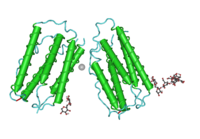
Photo from wikipedia
Effective antiviral agents are urgently required to prevent and treat individuals infected with SARS-CoV-2 and other emerging viral infections. The COVID-19 pandemic has catapulted our efforts to identify, develop, and… Click to show full abstract
Effective antiviral agents are urgently required to prevent and treat individuals infected with SARS-CoV-2 and other emerging viral infections. The COVID-19 pandemic has catapulted our efforts to identify, develop, and evaluate several antiviral agents. ABSTRACT Effective broad-spectrum antivirals are critical to prevent and control emerging human coronavirus (hCoV) infections. Despite considerable progress made toward identifying and evaluating several synthetic broad-spectrum antivirals against hCoV infections, a narrow therapeutic window has limited their success. Enhancing the endogenous interferon (IFN) and IFN-stimulated gene (ISG) response is another antiviral strategy that has been known for decades. However, the side effects of pegylated type-I IFNs (IFN-Is) and the proinflammatory response detected after delayed IFN-I therapy have discouraged their clinical use. In contrast to IFN-Is, IFN-λ, a dominant IFN at the epithelial surface, has been shown to be less proinflammatory. Consequently, we evaluated the prophylactic and therapeutic efficacy of IFN-λ in hCoV-infected airway epithelial cells and mice. Human primary airway epithelial cells treated with a single dose of IFN-I (IFN-α) and IFN-λ showed similar ISG expression, whereas cells treated with two doses of IFN-λ expressed elevated levels of ISG compared to that of IFN-α-treated cells. Similarly, mice treated with two doses of IFN-λ were better protected than mice that received a single dose, and a combination of prophylactic and delayed therapeutic regimens completely protected mice from a lethal Middle East respiratory syndrome CoV (MERS-CoV) infection. A two-dose IFN-λ regimen significantly reduced lung viral titers and inflammatory cytokine levels with marked improvement in lung inflammation. Collectively, we identified an effective regimen for IFN-λ use and demonstrated the protective efficacy of IFN-λ in MERS-CoV-infected mice. IMPORTANCE Effective antiviral agents are urgently required to prevent and treat individuals infected with SARS-CoV-2 and other emerging viral infections. The COVID-19 pandemic has catapulted our efforts to identify, develop, and evaluate several antiviral agents. However, a narrow therapeutic window has limited the protective efficacy of several broad-spectrum and CoV-specific antivirals. IFN-λ is an antiviral agent of interest due to its ability to induce a robust endogenous antiviral state and low levels of inflammation. Here, we evaluated the protective efficacy and effective treatment regimen of IFN-λ in mice infected with a lethal dose of MERS-CoV. We show that while prophylactic and early therapeutic IFN-λ administration is protective, delayed treatment is detrimental. Notably, a combination of prophylactic and delayed therapeutic administration of IFN-λ protected mice from severe MERS. Our results highlight the prophylactic and therapeutic use of IFN-λ against lethal hCoV and likely other viral lung infections.
Journal Title: Journal of Virology
Year Published: 2022
Link to full text (if available)
Share on Social Media: Sign Up to like & get
recommendations!